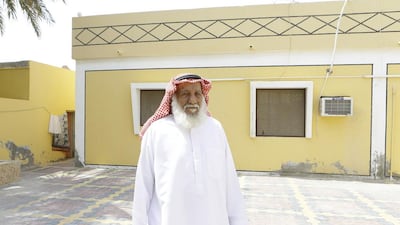FUJAIRAH // Families say living near a quarry is affecting their health, as explosions rock their homes and dust causes breathing problems.
Saed Al Yamahi, who lives in Al Taween, Fujairah, said his son had developed a chronic respiratory problem, while doctors at a local hospital estimated that 60 per cent of their patients had breathing troubles.
Mr Al Yamahi, 43, lives a few kilometres away from the quarry with his wife and 15 children.
“Explosions damaged our house foundations and electricity connections,” he said.
“I managed to afford maintenance work three years ago and it cost about Dh150,000, but the house needs more and we can’t afford it.”
His wife, Umm Mohammed, said: “Every Monday and Wednesday the house shakes badly due to the explosions, and last week the chandelier fell from the ceiling and could have harmed our kids.
“The nearby crusher increases the amount of dust in the air, as well as the unpaved roads around us, and this is unsafe and affects our health.”
She says her son, 3, has developed a chronic breathing disorder that cannot be treated in the local medical centre, so they have to drive him for an hour for treatment.
“I am a strong woman but I don’t know how long I can manage my fear and anxiety when it comes to my children’s health and safety,” Umm Mohammed said.
Hasan Al Yamahi was diagnosed with asthma when he was only 4 months old and now he has medicine added to his milk once a day to prevent his airways from inflaming.
“The medicine can’t treat the asthma attacks, so if he has one we rush him to Saqr Hospital in Ras Al Khaimah,” said Umm Mohammed.
“But if his condition is worse we take him to Dibba Hospital, as it’s a bit closer than Saqr.”
She and two other children were also sensitive to dust.
Seventy quarry companies operate in Fujairah.
Dr Pratap M B, head of emergency at Al Sharq Hospital in Fujairah City, said most patients with respiratory diseases were children under the age of 5.
Dr Pratap said that 5 per cent of them had symptoms of asthma.
“Respiratory infections are considered the number one disease that affects most of the children,” he said. “It can develop and be caused by many things such as environmental factors, lack of cleanliness and weather changes and conditions.”
Another family said their home’s foundations had been rocked by explosions.
“The house is 37 years old and we tried to maintain it as much as possible but the walls keep on cracking because of the explosions,” said Rashid Al Yamahi, 80.
“We added two more rooms in 2001 and in winter one of them leaks water from the ceiling. Each time we fix it, it cracks again.”
Fujairah’s natural resources department said that dust-control techniques were being introduced at all quarries and mines.
“According to the law, crushers and quarries should be 3 kilometres away from residential areas and dust control techniques are implemented at the sites to minimise the amount of dust in the air,” said Ali Qasim, the department’s general manager.
“It’s all supervised by a team that checks on all the mining sites twice a day.”
He said the 70 quarries were in Al Hayl, Thoban, Al Siji, the Friday Market area, Al Taween and Habhab.
“Sixty-four devices around the emirate measure the amount of dust in the air,” Mr Qasim said.
“Eighteen of them are in Al Taween and it’s all connected to an operations room that records the measurements.
“If the dust exceeds the allowed limits, especially during the night or high humidity days, either we stop half of the working crushers or all of them.”
The department said explosions and vibration complaints could be filed with Fujairah Police. For any other complaints, the department can be reached on 09 224 3355.
rhaza@thenational.ae

